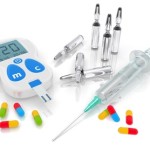Three Ways to Mess Up Your Hormonal Balance
You may have blamed your hormones for health problems from mood swings to weight gain to depression. Or you might have used hormones as a way to build muscles and strive for lost youthfulness. When you understand what hormones are and how they work, you can make informed choices to achieve hormonal balance and avoid dangers.
Examples of well-known hormones include insulin, thyroid, estrogen, testosterone, growth hormone, cortisol, and vitamin D. However, there are dozens of others with indispensable roles in maintaining health.
WHAT ARE HORMONES AND WHY DO WE HAVE THEM
Your body is an awesome composition of 100 trillion cells. Imagine the chaos that

Hormones are often blamed for a wide variety of medical issues. But what if it’s lifestyle choice, not hormones, that is the root cause of these problems?
would destroy its orderly operation if these cells had no way of communicating with each other.
Hormones are chemical messengers that carry information, via flowing through your blood, from one group of cells to others. This process orchestrates the coordination that keeps your body functioning. For example, blood pressure, acid/base status, and blood levels of sodium, calcium, and glucose must all be kept within narrow limits for life to continue. Hormones play a major role in making sure these requirements are met, directing such vital functions as growth, reproduction, and metabolism.
HOW YOUR HORMONES WORK
Since hormones circulate in blood, which reaches your entire body, you might think that all hormones act on all cells. However, your body has a clever way of making

Hormones and their receptors are great illustrations of the fact that you can’t put a square peg into a round hole
sure that a specific hormone narrows its effects.
A hormone can target only cells which have a receptor that “fits” it. This is often compared to a lock-and-key system, with the receptor being the lock and the hormone being the key. You can also understand this system by thinking of the common expression that you can’t fit a square peg into a round hole.
In understanding hormones and health, the receptors are as important as the hormone itself. Some hormones have receptors on most cells, while others act far more selectively. Once a hormone binds to its receptor, the targeted cell responds by taking action, making some change that is consistent with the goal the hormone is designed to regulate.
ARE HIGHER HORMONE LEVELS DESIRABLE?
Because hormones have such profound influence on functioning, typically your body secretes them only tiny amounts. Even these small quantities generally have only a short time to be active, and most are soon biologically destroyed or inactivated. It’s as if your body would rather have too little and release more as needed, than have too much and suffer what might be dire consequences.
To quote from a National Cancer Institute training site: “Hormones are very potent substances, which means that very small amounts of a hormone may have profound effects on metabolic processes. Because of their potency, hormone secretion must be regulated within very narrow limits in order to maintain homeostasis in the body.”
A common myth in understanding how your body functions is the idea that, if a little
is good, more is better. More frequently the truth is that if a little is good, more is toxic excess. Hormones illustrate that principle perfectly. Most circulate in amounts so tiny that special methods are needed to measure them. Concentrations of key hormones can optimally be as low as one billionth of a milligram per milliliter of blood.
THREE WAYS TO MESS UP YOUR HORMONES…OR NOT
Experts conclude that over half of people in Western societies develop a hormone-related disease at some point in their lives. Common examples include diabetes (both type 1 and type 2), polycystic ovary syndrome, osteoporosis, and hypothyroidism.
Your body is designed to precisely regulate the exact amounts of hormones and receptors it needs. However, hormone-related disease occurs for many reasons, and sometimes cannot be avoided. Prevention of these diseases is maximized when you avoid three common ways of messing up your hormones. Here they are, in reverse order of destructiveness.
ONE. Enjoying the worst of modern lifestyles. Examples include staying indoors all

Fragrances in candles and many other products are among the thousands of man made chemicals that may disrupt hormonal functioning
day, sitting for hours at a stretch, avoiding exercise, too little or erratic sleep, and constantly rushing and skipping meals. Contact with fragrances, herbicides, pesticides, and thousands of other manmade chemicals also can disrupt your hormones.
TWO. Second guessing your body by supplementing with hormones that are not for clinical treatment of a diagnosed disease. Artificially high hormone levels as a result of supplementation can be profoundly dangerous. A valid reason to supplement with hormones is a thoughtful decision by a fully informed patient. This choice would be made in partnership with a knowledgeable health team and after carefully considering all options for treating a diagnosed illness. Use of hormones for general lifestyle goals such as “anti-aging,” stronger muscles, weight loss, and enhanced sexuality can result in serious consequences.
THREE. Eating animal foods. In thinking about ingesting hormones your body did not produce, recall that all animal foods contain hormones (whether the animal was raised organically or not). This is because animals need hormones to maintain homeostasis and reproduce, and animal hormones are often similar or identical to human hormones. In addition, your digestion and metabolism of animal foods can

Eating animal foods is the most devastating way you can disrupt your hormones through lifestyle choices
act to disrupt your own hormonal functioning in multiple ways.
You can choose to avoid these perils, giving your body its best opportunity to maintain hormonal balance and healthy functioning.
If you enjoyed this post, you may want to understand why whole plant foods are such a potent “anti-aging” tool.
Intrigued? Now you can use our Whole Foods Blog Finder to target informative, fun postings on whole foods, plant-based diets. Quick information at no cost!
Post written by Janice Stanger, Ph.D. Janice authored The Perfect Formula Diet: How to Lose Weight and Get Healthy Now With Six Kinds of Whole Foods. This book outlines a whole foods, plant-based diet and tells you why it works. A version of this article (also authored by Janice Stanger) was published on the Forks Over Knives site under a different title.
Tags: hormonal balance, hormones, whole foods plant-based diet






